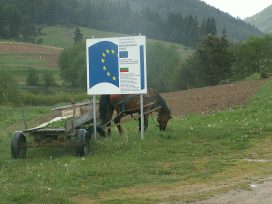Europe after the Kosovo War
The Kosovo war should force the European Union to rethink its future. As the new commission, chaired by Romano Prodi, takes over it should seize the opportunity to move the EU from an inward-looking institution consumed with an economic agenda to an all-European political project.
The Ambiguous Attitude of the Members of the EU Toward a Reunited Europe
“The return to Europe” was a central motto of the peaceful revolution in Central Europe ten years ago. The reunification of Europe was to overcome the legacy of Yalta and ensure peace, security, democracy and development. While the idea of a “return” expressed an idealized vision of the Europe of values and common heritage, its concrete expression was the desire to join the process of European integration successfully developed in the western part of the continent.
The West, however, was ill prepared to face the revolutionary challenge from the East. Western Europe’s attitude towards its eastern neighbors remained ambiguous. On the one hand, the EU has always claimed to support the ‘unification of Europe’. This translated into a series of positive initiatives towards the aspiring newcomers: the PHARE program, the EBRD, the association agreements leading to a slow but steady strengthening of the EU’s ties with candidate countries. Yet the identity of integrated western Europe was the product of the horrors of the Second World War and of the divisions and fears of the Cold War period. This distinct genealogy contributed to the fact that after 1989 the real priority of the Union was not the rapid reunification of Europe, but rather deepening integration of its western half, and protecting itself from possible destabilizing effects of radical geopolitical changes. The Maastricht agreement and the launch of the Euro were landmarks of that process.
Ten years after the fall of the Berlin Wall, the vision of a reunited Europe seems to have vanished. In spite of official declarations to the contrary, EU enlargement is not considered a real priority. The member states do not seem ready to make the necessary reforms and bear the costs of enlargement. These are actually overstated, while the long-term positive effects of enlargement are generally underestimated. The re-nationalization of the priorities of the member states became clear at the Berlin summit earlier this year. The negotiations on the so-called ‘Agenda 2000’ were marked by squabbling between the member states defending their vested interests. The final compromise was based on a tacit understanding that EU enlargement would not be possible before the second half of the next decade.
EU Enlargement: A Labour of Sisyphus
There is now a striking asymmetry in the process of institutional adaptation necessary for EU enlargement. The EU has been unable so far to transform its institutions and procedures in order to cope with the new members. The candidate states, on the other hand, have, in order to qualify for membership of the EU, to swallow 80.000 pages of rules and regulations known as the acquis communautaire . This is a labour of Sisyphus, since the acquis grows faster than the capacity to absorb it in East European legislation. Much of the ‘acquis’ – the product of a long and complex history of the EU – is hardly relevant to the development of the new democracies. Nor is this straitjacket of regulations the best way to equip free market economies to compete if parts of it are not implemented by existing member states themselves. Yet, they are authoritatively imposed as a condition sine qua non for new candidate states feeding frustration and potential resentment in Central Europe in a process where the ends seem to have been confused with the means.
The Balkan Wars and Their Consequences for the EU
History moves faster than politics, which moves faster than institutions. The Balkan wars and their consequences have overtaken the EU’s enlargement policy. They point to the special role of the western alliance, and most of all of the European Union, in assuring peace and security in the Balkans and in promoting democratic nation-state building in the region. The real long-term success of the Kosovo war can be assured only by the prospect of integration of the Balkans in the developed Europe. Failed states of southeastern Europe are being transformed into formal or informal protectorates implying deep involvement of Europe in the creation of security for the whole region. This requires political involvement as well as massive inflows of resources in order to rebuild and to ensure their development. The European Stability Pact for the Balkans is a decision not dictated by economic considerations but a result of political, strategic, and moral considerations.
Central Europe, with its experiences of democratic and economic transformation, can and should make a useful contribution to the reconstruction in the Balkans. However, two undesirable consequences could follow from the present situation. Given the Balkan emergency, the enlargement process to the stable and consolidated democracies could be downgraded or slowed down. Even more unsettling would be the consequences for countries that fall between two stools (neither protectorate nor first circle of enlargement) such as Slovakia, Bulgaria and Romania. In both cases the result could be a destabilizing anti-European backlash.
The Right ‘Agenda 2000’
Instead, the EU’s direct involvement in the Balkans should lead it to rethink its enlargement strategy. It should embark now on a policy of an accelerated political and security integration of the countries of Central Europe without slowing down their economic integration. This would not be seen as ‘second class’ membership, but rather as the right ‘Agenda 2000’, the proper answer to the hopes of a genuinely reunited Europe that were reborn in 1989. It would also send a positive European signal for the post-war reconstruction in the Balkans.
Timothy Garton Ash, writer and Fellow of St. Antony’s College, Oxford
Janos Kis, Professor of Philosophy, Central European University, founder of the Alliance of Free Democrats, Budapest
Adam Michnik, Editor-in-Chief of the daily Gazeta Wyborcza , Warsaw
Jacques Rupnik, Professor, Fondation Nationale des Sciences Politiques, Paris
Karl von Schwarzenberg, former Chancellor in the office of the president Vaclav Havel, Prague
Martin M. Simecka, Editor-in-Chief of the daily SME , Bratislava
Aleksander Smolar, Chairman of the Board of the Batory Foundation, Warsaw and Research Fellow, CNRS, Paris
Published in
In collaboration with
Newsletter
Subscribe to know what’s worth thinking about.
Related Articles

The Second World War no longer serves as a history of the western European present. The current era is marked by a different set of problems, not least the fading appeal of the model of democracy installed after 1945.

Steady access to safe, drinkable water is still a privilege, and Europe is struggling with ever-worsening droughts. The new episode of the Standard Time talk show discusses chemical hazards, eco guerrillas, and why we can never have enough pelicans.





